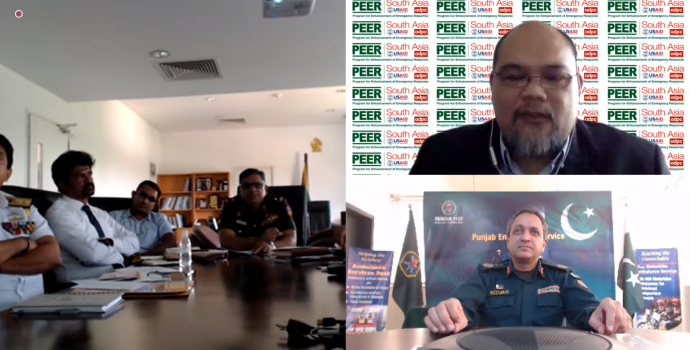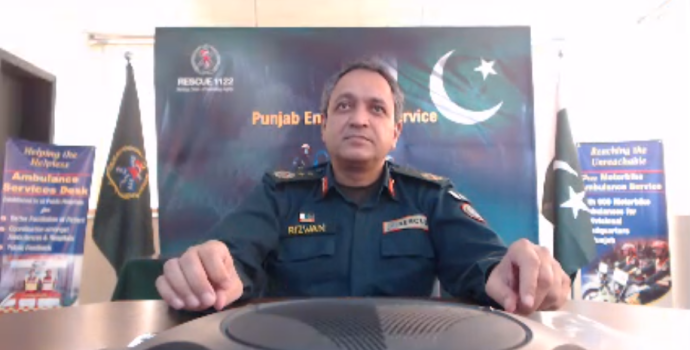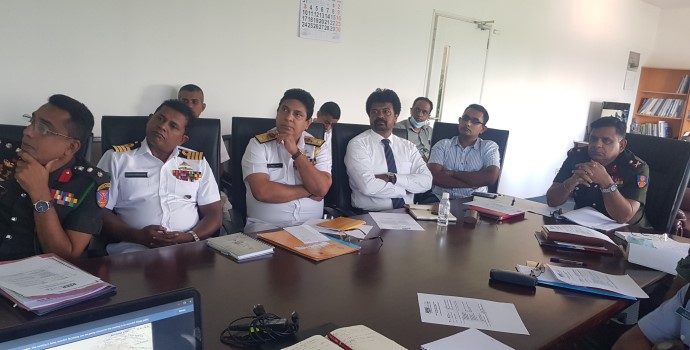- About Us
-
Who we are
-
- Publications
-
- ADPC Academy
-
MediaADPC'S NEWS
Equipping communities with lifesaving skills through knowledge sharing Equipping communities with lifesaving skills through knowledge sharing
26 Aug 2020
Colombo, Sri Lanka

Participants discussing Sri Lanka's existing capacities in disaster risk management.
As the COVID-19 pandemic continues to aggravate situations worldwide, Sri Lanka is brainstorming with local, regional and international partners to improve its capacities for disaster preparedness and emergency response.
Sri Lanka recently joined the fifth phase of Asian Disaster Preparedness Center's (ADPC) Strengthening Institutionalization of the Program for Enhancement of Emergency Response in South Asia (PEER Stage-5) which kick-started a series of upcoming meetings to assess existing capacities in disaster risk management by partner organizations.
ADPC through its PEER program organized a cluster working group meeting with the Disaster Management Centre (DMC) in Sri Lanka and Rescue 1122 Punjab Emergency Service in Pakistan to introduce Sri Lanka to the Community Action for Disaster Response (CADRE) training program.
Maj. Gen. S. Ranasinghe (Retd.), Director General of Disaster Management Centre (DMC) in Sri Lanka chaired the meeting. The meeting opened up ways of exploring possible avenues for CADRE integration into existing plans/programs of institutions, identified processes for CADRE curriculum standardization in Sri Lanka and the formation of Technical Curriculum Review Group (TCRG) with partners.
Pakistan's experiences and lessons learned on integrating CADRE

Dr. Muhammad Rizwan Naseer, Director General of Rescue 1122 Punjab Emergency Service in Pakistan sharing country lessons with Sri Lanka.
Dr. Muhammad Rizwan Naseer, Director General of Rescue 1122 Punjab Emergency Service in Pakistan provided a snapshot of the immense work undertaken by Rescue 1122 in the country and explained how CADRE was integrated into the local context.
Dr. Naseer elaborated how Pakistan became the first South Asian country to obtain International Search and Rescue Advisory Group (INSARAG) certification from the United Nations and explained the procedure to Sri Lanka. He also highlighted the benefits of PEER's Collapsed Structure Search and Rescue training component in laying the foundation of emergency capacities in Pakistan.

Sri Lankan officials and partner organization representatives listening to the meeting's discussions.
Officials representing various partner organizations like Sri Lanka Army's Centre for Disaster Response Team, Sri Lanka Navy, Sri Lanka Air Force, Asia Pacific Alliance for Disaster Management Sri Lanka (A-PAD SL), Sarvodaya, Sri Lanka Red Cross Society (SLRCS), UN World Food Programme (WFP), World Vision and Sri Lanka Life Saving Association attended.
Officials present in the meeting were highly encouraged and motivated to take up this process and streamline the training systems and curriculum of emergency courses through PEER.
CADRE holds special significance as local community members are the first to reach the disaster-affected area. Alongside basic first aid training, CADRE also teaches people how to deal with mass casualty incidents and how to assist injured people. It demonstrates how to carry out light search and rescue operations. Most of the CADRE training is active, wherein participants ‘learn by doing’.
Pakistan is one of the pioneers of PEER institutionalization and CADRE adoption through Rescue 1122 Emergency Service Academy. With a trained pool of master instructors and community response teams, their services include providing ambulance, rescue, and fire services.
ADPC's PEER Stage-5 program is supported by the U.S. Agency for International Development, Bureau of Humanitarian Assistance (USAID BHA).
Latest NewsRelated Trainings
-